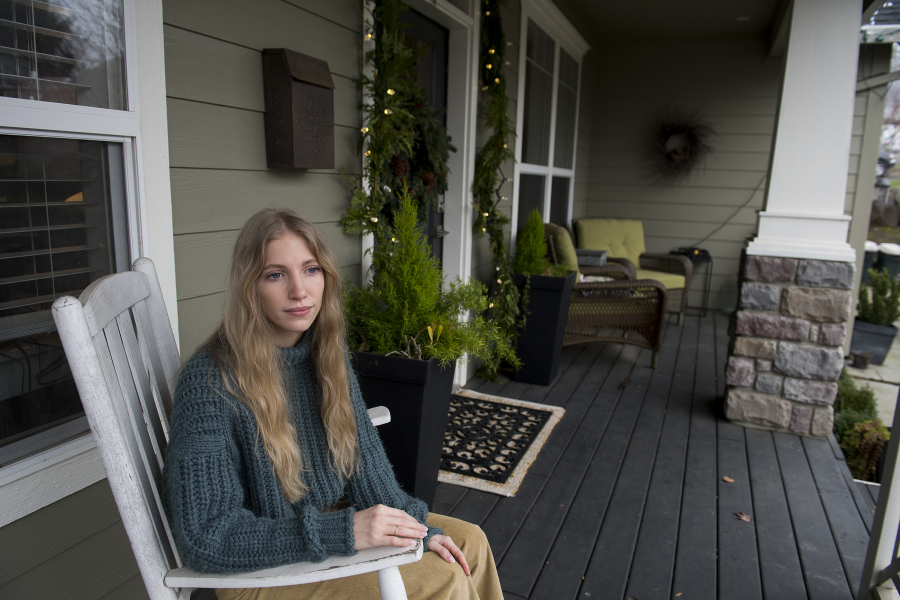
Editor’s Note: Ashley Dumont is a 21-year-old student at Washington State University Vancouver. Still struggling with COVID-19 symptoms months after her infection in June, it’s hard for Dumont to have prolonged conversations. She answered questions through email, writing about what she refers to as her “COVID-19 journey.” This is an oral history, told from her perspective, about how COVID-19 still impacts her life six months after the virus left her body.
I just want to feel like a normal 21-year-old again.
This all started with one mistake, six months ago. I was pretty good about following COVID-19 precautions. I isolated myself at home in Vancouver with my family of five for months. I followed the rules.
But then my 21st birthday came in mid-June, and I just wanted a couple days of normalcy. Friends asked me to visit Boise, Idaho, so we could go out to bars and restaurants — a typical 21st birthday in an atypical year.
I was worried about traveling and celebrating during a pandemic, but friends assured me that Boise bars and restaurants followed precautions. Case counts were relatively low locally, they said.
When I returned home from my trip on June 16, Boise health officials said outbreaks happened at three of the bars I visited in Boise. I had a cough and a congested nose, but I didn’t necessarily think I had it.
Still, I called a medical provider and they recommended getting tested. My test returned positive June 18. Two days later, I was in the emergency room with severe shortness of breath.
I exposed my family to the virus, including a 14-month-old niece. They experienced mild symptoms and fully recovered, but what I got was much worse — and six months later, it’s still with me.
At first, I felt like my body was giving up on me. I checked into the emergency room because my breathing was so labored that it felt like I was in the middle of running a marathon, even though I was lying in bed.
Two days after the trip to the emergency room, I began taking virtual classes for my elementary education program at Washington State University Vancouver. I was embarrassed about asking professors for accommodations, even though I barely had the energy to walk to the bathroom. Now I was expected to take six online classes.
The first time I left my house after two weeks of quarantine, I walked around the WSU Vancouver campus. After 10 minutes, I began to experience shortness of breath. I knew then that the virus, while gone from my body, wasn’t gone from my life.
I still had extreme fatigue, weakness, headaches, dizziness, shortness of breath, tingling in my arms and legs, chest pain and brain fog. I’m a young, healthy, active person. This wasn’t normal for me.
Walking up the stairs was challenging. So was fetching mail. Even driving down the street to the local pharmacy was a tough task.
When I’m too active or mentally overwhelmed, I breathe heavily, unable to catch my breath. A tingling sensation spreads across my face, down to my toes and muscles. It runs throughout my whole body. My hands contract, then my mouth, then my legs, then my tongue. It’s scary. I don’t know what to do to stop it.
Doctors told me this is how a body can react to losing too much carbon dioxide. I’ve seen multiple specialists, including a pulmonologist and a cardiologist. I’ve been prescribed five different steroid inhalers. We’ve done trial and error. Nothing has permanently worked.
After I have a breathing episode, I need assistance just to walk around the house. I can’t hold long conversations. Sometimes it feels like a 20-pound weight is resting on my chest. I have sharp pains in my body.
Brain fog frequently wipes away my short-term memory. My speech slows down. I can’t focus. The classes I’ve been looking forward to in school become much more difficult.
One scary episode sent me back to the emergency room a few weeks ago. My doctors decided I should do pulmonary rehab. I’m the youngest patient at the clinic.
I’m worried about catching coronavirus again, and I’m worried about others catching it. Clark County’s case counts have been high this fall and winter. I hope people listen to the experts and follow the guidelines. I know how much one mistake — a couple of days of seeking normalcy — can change your normal.
Now I’m constantly physically and mentally exhausted. I’m suffering. On good days, I can walk to the mailbox, grab the mail and walk back inside without having difficulty breathing or chest pain.
That’s just a best case scenario. I still don’t know when things will improve. I still don’t know when I’ll feel like myself again. I have no control over my body.
Still, I like to keep things positive. Right now, I’m looking for answers — for myself and others. I’m hoping doctors can research what’s happened to me to learn more about long-haulers and how to make us better. I’m optimistic that will happen, and I can feel like a normal 21-year-old again.
"severe" - Google News
January 06, 2021 at 09:04PM
https://ift.tt/35jaUt7
Ashley Dumont, 21, has severe symptoms 6 months after coronavirus: 'I have no control over my body' - The Columbian
"severe" - Google News
https://ift.tt/2OrY17E
Shoes Man Tutorial
Pos News Update
Meme Update
Korean Entertainment News
Japan News Update
Bagikan Berita Ini















0 Response to "Ashley Dumont, 21, has severe symptoms 6 months after coronavirus: 'I have no control over my body' - The Columbian"
Post a Comment